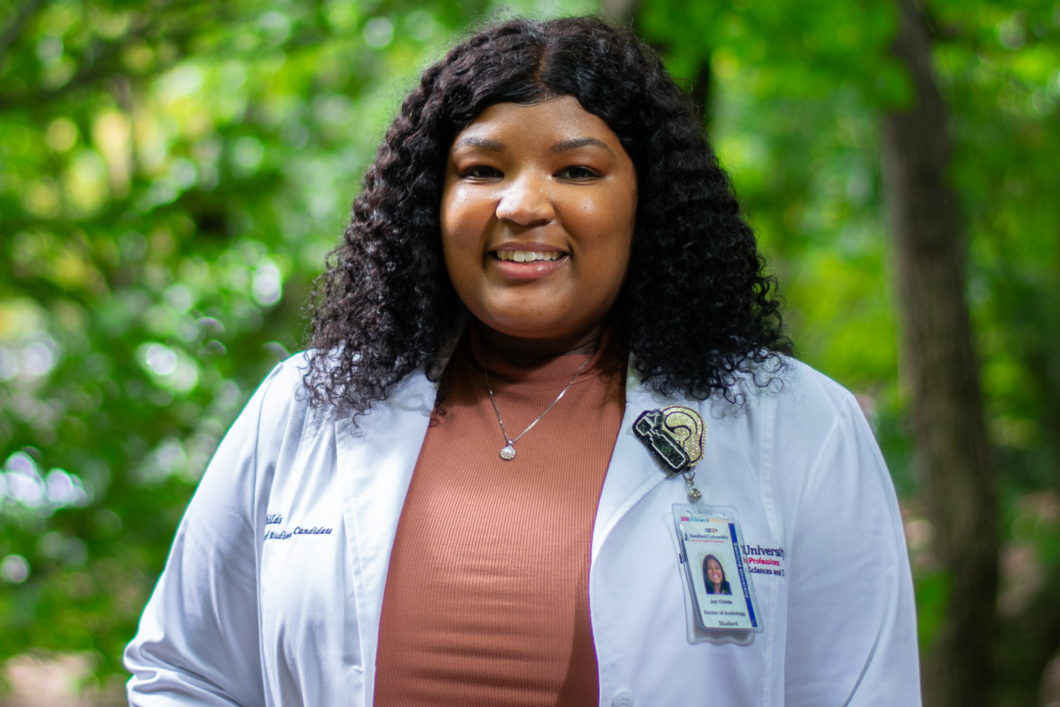As an undergrad, Jori Childs found the grad school application process overwhelming; but she learned a lot about self-reflection and the importance of asking for help during the process. In grad school, she used those lessons-learned to seek out other opportunities to help her grow as a student leader and as a future audiologist.
Quick Facts About Jori
- Currently pursuing a doctor of audiology degree at Samford University in Alabama
- Holds a bachelor’s degree in CSD and a minor in Spanish from the University of Southern Mississippi
- Interested in pediatric audiology, early hearing detection and intervention, and hearing aids
- National NSSLHA member for 2 years, 2020-2021 National NSSLHA Student State Officer (AuD) in Alabama
- ASHA S.T.E.P. mentee; member of the Student Academy of Audiology, Georgia Academy of Audiology, and NBASLH
- Played the trumpet in a St. Patrick’s Day parade in Dublin, Ireland
How Have You Overcome Your Greatest Challenge as a CSD Student?
When I was applying to grad programs, I applied to schools while not fully understanding what I should look for in a program, like programs fit my future career goals of research and pediatric audiology. I just applied anywhere and everywhere without caring if it was a good fit or not. I didn’t know who or how to ask for help during the application process. It was a frustrating experience that left me feeling overwhelmed.
I finally realized that connecting with other students was a good way to learn about the application process for graduate school. I reached out to friends who had already been accepted to CSD graduate programs and asked for help on how to best present myself and improve my GRE scores to be a better candidate.
What Advice Would You Give Others Who Are Going Through Similar Challenges?
When applying to grad school, take an active role in the process. Really look into programs to see if you think you’ll get the best experience to be a successful student. Not all programs are made the same.
First, think about the topics that interest you and the skills you want to learn:
- Do you want to work with pediatrics or adults?
- Are you interested in a particular area of practice?
- What kinds of research opportunities are you interested in and are available at the programs you like?
Then, think about logistics, financial considerations, and personal preferences:
- Are you willing to move out-of-state or do you want to stay close to home?
- Do you want to be part of a small or a large program?
- What are the programs’ Praxis pass rates?
- What’s the tuition rate and how will that impact your financial future?
Start your research early (create a timeline—with deadlines—that’s comfortable for you) and reach out to current students and professors at the programs you’re interested in to get an idea of what each grad program is like. Don’t be afraid to ask for help and get answers to your questions!
What Motivates You to Wake Up and Pursue Audiology?
There aren’t many Black audiologists in the professions. Having the opportunity to work with clients who may not typically see a person of color in this role motivates me every day and confirms that I’ve found my calling in life. It makes all the late-night study sessions and early morning clinic days all worthwhile.
I love working with children and plan to return to my home state of Georgia to become a pediatric audiologist. By being involved in multiple organizations as a student, I’ve learned how to network and seek out opportunities that will benefit me as a future pediatric audiologist. At regional and national conferences, I’ve networked with pediatric audiologists from many different states and I keep in touch with all of them. Through our check-ins, they offer me advice and provide resources for future employment.
What Doors Have Opened for You as a National NSSLHA Member?
As a National NSSLHA member, I have access to a variety of resources and unique opportunities that are helping me complete my goal of becoming a competent professional. I’ve . . .
- enhanced my leadership skills through my role as National NSSLHA’s 2020-2021 SSO (AuD) in Alabama—connecting NSSLHA chapters throughout the state.
- participated in an ASHA user research project for diversity recruitment.
- participated in the Audiology Students Cohort at the 2019 ASHA Convention which allowed me to network with other students and early career professionals to learn about opportunities such as the Minority Student Leadership Program and ASHA’s S.T.E.P. program.
I’m proud to be a National NSSLHA member because I’m able to give back and help others navigate their CSD student experience—like going through the grad application process. Since becoming a National NSSLHA member and student leader, I’ve been fortunate to surround myself with people to guide me and provide me with resources for success. I want to be a source of hope and information for others . . . like National NSSLHA has for me.

